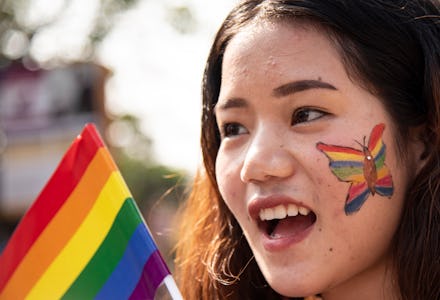More young people identify as LGBTQ+ than ever before

According to new data, there may be more people who identify as queer in the U.S. than ever before. Don’t get too excited: There hasn’t been a rainbow invasion, it’s just that more and more young people say they don’t identify as heterosexual. This new Gallup poll suggests that 1 in 6 Gen Z-ers identify as LGBTQ+.
The report, which was released this morning, asked more than 15,000 adults about their sexuality and gender identity throughout 2020. When asked about their sexual orientations, 16% of folks born between 1997 and 2002 — Gen Z — said they identify at LGBTQ. Over 9% of Millennials and about 4% of Generation X said they weren’t straight.
The report also seems to show that people who identify as women are less likely to identify as heterosexual than people who identify as men. Women were almost twice as likely as men to identify as LGBTQ. Unsurprisingly, there were also some correlations with political ideology: About 13% of liberals identify as LGBTQ+, compared to only 4% of moderates and 2% of conservatives.
In total, a whopping 5.6% of Americans surveyed said they identify as lesbian, gay, bisexual, transgender, or queer, which is up from 4.5% in 2017. To this I say: Hurrah, the gay agenda is working faster than we ever dreamed! If we can pull a percentage point every three years, world domination is just around the corner. Just kidding. Kinda. It is good news, but it doesn’t mean there are actually more gay people now than three years ago.
What the report does imply is that more people are now comfortable talking about being queer. “Younger people are growing up in an environment where being gay, lesbian or bisexual is not as taboo as it was in the past,” Gallup editor Jeffrey Jones told NBC. “So they may just feel more comfortable telling an interviewer in a telephone survey how they describe themselves. In the past, people would maybe be more reluctant.”
It would be really cool to think that the younger generation's bodies are evolving past limited binary notions of sexuality, but we can’t know whether there are actually more queer people or if people are just more willing to own their queerness. Still, the fact that 16% of young people are comfortable claiming something outside the het-norm indicates a cultural shift, even if it doesn’t show a biological one. That shift could be crucial for queer people of every age.
“The more people who feel comfortable and safe in disclosing who they are, the more others will disclose, and the more people will be living authentically as who they are in the world,” Dulcinea Pitagora, a New York City-based psychotherapist who works primarily with sexually marginalized folks, tells Mic. “Also the more awareness [there is] around how many queer people there actually are in the world, the more people will realize the great diversity in the queer community, and the more non-queer people will realize they have more in common with queer people than they may have realized.”